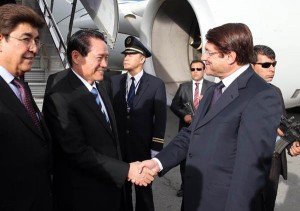The China Metallurgical Group Corporation (MCC) is about to commence a copper mine at Mes Aynak, Afghanistan:Â
This site is called Mes Aynak and is nothing short of awe-inspiring: a massive walled-in Buddhist city featuring massive temples, monasteries, and thousands of Buddhist statues that managed to survive looters and the Taliban. Holding a key position on the Silk Road, Mes Aynak was also an international hub for traders and pilgrims from all over Asia.
Hundreds of fragile manuscripts detailing daily life at the site are still yet to be excavated. Beneath the Buddhist dwellings is an even older yet-unearthed Bronze age site indicated by several recent archaeological findings.
Mes Aynak is set for destruction at the end of December 2012. All of the temples, monasteries, statues as well as the Bronze age material will all be destroyed by a Chinese government-owned company called China Metallurgical Group Corporation (MCC). Six villages and the mountain range will also be destroyed to create a massive open-pit style copper mine.
The $3 billion mining deal, signed in 2007, represents the largest foreign investment in Afghanistan’s history.

Source: Xinhua
Meanwhile, Zhou Yongkang, Politburo Standing Committee member, head of the Politics and Law Commission/law enforcement, and supposed erstwhile ally of Bo Xilai (tip: be highly skeptical of sensationalist news coming out of Taiwan or the Falun Gong) just made a surprise visit to Afghanistan. Is there a direct connection? Hard to say.
But the mining deal and Zhou Yongkang’s surprise visit is emblematic of a few things relevant to Chinese foreign policy in Central Asia, and the developing world in general. China’s interests in Afghanistan and the rest of Central Asia involve: co-opting corrupt, crony capitalist elites in neighboring authoritarian states so that Chinese state-owned corporations (and Chinese workers, protected by armed Chinese security guards) can extract resources; developing alternative supply chains to the Persian Gulf-Indian Ocean-Malacca Straits shipping route, especially by building oil pipelines from Kazakhstan into Xinjiang; and cooperating with said Central Asian states (especially through the Shanghai Cooperation Organisation) to fight terrorism aimed at splitting Xinjiang from China. China’s interests in Africa and other parts of the developing world are similar, minus the fighting terrorism part.
In my mind, all of this very invasive economic activity calls into question the entire bedrock of Chinese foreign policy: non-interference in other countries’ internal affairs. Apparently, MCC’s actions have incited Afghani villagers near Anyak to partner with the Taliban to attack the mine and the archaeologists still working to preserve the Buddhist site. China, through its state-owned enterprises (SOEs), simultaneously lends military support to various odious regimes (including Sudan, Iran, Zimbabwe, Venezuela, obviously North Korea, and to some extent, although this is now changing, Burma), enriches the elites of those and other countries with vast resource extraction deals, and screws over locals by almost exclusively employing imported Chinese workers and spoiling the local environment. In return, the Chinese compensate in-country locals with a few infrastructure projects, worth far less in proportion to the benefit China accrues from such deals. China cannot hide behind any facade–China’s SOEs are implements of Chinese foreign policy.
The U.S. and other interested partners need to work more actively to call out not only China’s abusive actions in the developing world, but also this obvious contradiction in China’s foreign policy. China is particularly weak ideologically on this front, given that its policy of non-interference aims to thwart others who would interfere in China’s own internal affairs. Forcing China to explain its actions and apparent hypocrisy would:
- Strengthen the U.S. case for Chinese participation in greater sanctions against Iran (which it apparently has not been successful at doing).
- Reduce threats to U.S. interests and human rights generally through squeezing supply chains to China’s client states.
- Improve the competitive advantage of U.S. corporations in bidding against Chinese SOEs. If U.S. corporations can present themselves as environmentally-friendly and ethically/socially-responsible in an environment where developing countries are pressured to value those things, then they can win contracts even when Chinese SOEs underbid them. This could possibly improve the U.S. domestic economy (unless most profits are held overseas).
- Generally improve U.S. relations with the developing world, and set up a stark contrast between U.S. and Chinese actions in the minds of the Global South. U.S.-China relations are not necessarily zero-sum, but in Africa and elsewhere, every resources-for-infrastructure deal the Chinese sign is a deal not made by the U.S.. The Chinese, with the help of locally-based state-owned media such as Xinhua and CCTV, are telling one narrative to the populations of their trading partners. We can tell a different narrative, especially if our actions respect the environment, improve the local economy, and maintain local culture.
- And possibly (however unlikely), push China to revise its stated foreign policy to align with its actual practices, which would remove the ideological pretense behind its arguments on a whole host of issues, including humanitarian interventions, territorial disputes, and U.S. policies in East Asia.
The U.S. should use the U.N. as an outlet and work with human rights and minerals-certification NGOs, but it must also speak to the American domestic audience. Mark Landler’s recent piece in the New York Times describes the Obama administration’s tougher stance on China, especially in regards to US-China trade and the Pivot to Asia. The Obama administration needs to add this issue to the growing list of arguments made in front of domestic audiences, because average Americans can also play a pivotal role in an influence campaign (and it would of course also improve President Obama’s reelection chances).
Even if China doesn’t revise its foreign policy wholesale (which again, is nigh impossible in the short term), the U.S. can advance its interests in credible and measurable ways. Not to call China out on its hypocrisy abroad would be a huge missed opportunity.
